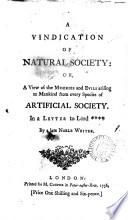
“Kings are ambitious; the nobility haughty; and the populace tumultuous and ungovernable.”
A Vindication of Natural Society (1756)
Context: Kings are ambitious; the nobility haughty; and the populace tumultuous and ungovernable. Each party, however in appearance peaceable, carries on a design upon the others; and it is owing to this, that in all questions, whether concerning foreign or domestic affairs, the whole generally turns more upon some party-matter than upon the nature of the thing itself; whether such a step will diminish or augment the power of the crown, or how far the privileges of the subject are likely to be extended or restricted by it. And these questions are constantly resolved, without any consideration of the merits of the cause, merely as the parties who uphold these jarring interests may chance to prevail; and as they prevail, the balance is overset, now upon one side, now upon the other. The government is, one day, arbitrary power in a single person; another, a juggling confederacy of a few to cheat the prince and enslave the people; and the third, a frantic and unmanageable democracy. The great instrument of all these changes, and what infuses a peculiar venom into all of them, is party. It is of no consequence what the principles of any party, or what their pretensions, are; the spirit which actuates all parties is the same; the spirit of ambition, of self-interest, of oppression, and treachery. This spirit entirely reverses all the principles which a benevolent nature has erected within us; all honesty, all equal justice, and even the ties of natural society, the natural affections. In a word, my Lord, we have all seen, and, if any outward considerations were worthy the lasting concern of a wise man, we have some of us felt, such oppression from party government as no other tyranny can parallel. We behold daily the most important rights, rights upon which all the others depend, we behold these rights determined in the last resort without the least attention even to the appearance or colour of justice; we behold this without emotion, because we have grown up in the constant view of such practices; and we are not surprised to hear a man requested to be a knave and a traitor, with as much indifference as if the most ordinary favour were asked; and we hear this request refused, not because it is a most unjust and unreasonable desire, but that this worthy has already engaged his injustice to another. These and many more points I am far from spreading to their full extent. <!-- You are sensible that I do not put forth half my strength; and you cannot be at a loss for the reason. A man is allowed sufficient freedom of thought, provided he knows how to choose his subject properly. Tou may criticise freely upon the Chinese constitution, and observe with as much severity as you please upon the absurd tricks or destructive bigotry of the bonzees. But the scene is changed as you come homeward, and atheism or treason may be the names given in Britain, to what would be reason and truth if asserted of China.
